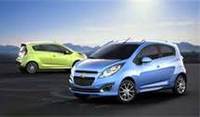Atypical Cars Outsell Typical Cars in the Long Run
 2013 Nissan Leaf |
CHICAGO--Aug. 13, 2013: A recent study shows that consumers' preferences for products with typical or atypical designs depend on how many times they have viewed the product before making a decision.
Aesthetic designs can help companies in establishing a point of differentiation for their products, especially when the products are used in public. One particularly important facet of a product's design is its typicality – the extent to which the design is typical of the entire product category. A new set of studies suggests that the extent to which consumers prefer typical or atypical product designs depends on how many times they have viewed these designs prior to making a purchase decision. This analysis appears in the September 2013 issue of the American Marketing Association's Journal of Marketing.
In one study, consumers were exposed to fictitious car designs that varied in terms of their design typicality either five or fifteen times. When consumers saw the car designs five times, they found the typical designs more appealing than the atypical ones. When, however, consumers viewed the designs fifteen times, the typical designs became less attractive, while the atypical designs tended to become more attractive. Another study shows that these findings also have real-world implications by analyzing sales patterns for 28 different car models in the German market. While cars with typical designs are more successful than cars with atypical designs shortly after they are launched, they rapidly lose in appeal after a few years and are eventually outsold by atypical cars.
"Car manufacturers should be more courageous in their design efforts and should try to come up with unusual and atypical designs", said Professor Jan Landwehr from Goethe University Frankfurt, Germany. "Although consumers may need some time to get used to cars with unusual designs, they may prefer them in the long run. Our results show that atypical cars start outselling typical ones after about three years and surpass them in terms of absolute sales after about five years." Joining Professor Landwehr in this research were Professor Daniel Wentzel (RWTH Aachen University, Germany) and Professor Andreas Herrmann (University of St. Gallen, Switzerland).
The researchers conclude that consumers may need time to get used to products with highly unusual designs, but may be more likely to buy such products in the end.


